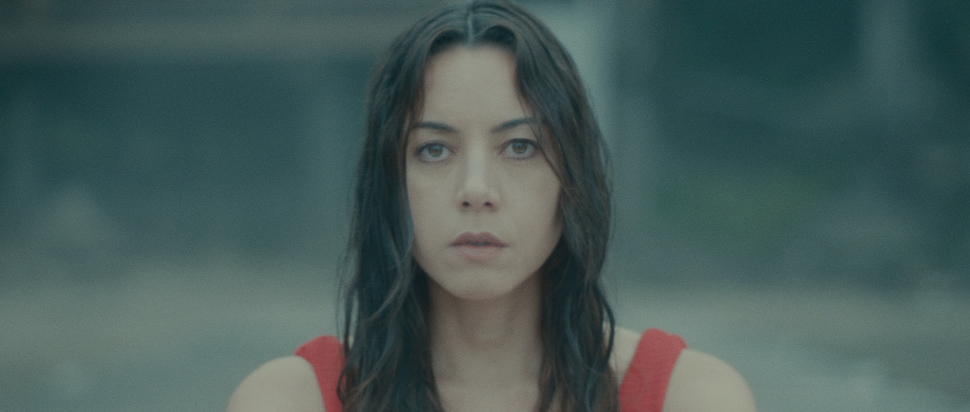Lawrence Michael Levine on Black Bear
Aubrey Plaza is a revelation in Lawrence Michael Levine's surprising dark comedy Black Bear. Levine got the idea from a dream – over our chat we dig into his subconscious and the surreal film's hidden meanings
One night, Lawrence Michael Levine had a dream. He can’t recall the precise details – the dream having faded from memory long ago – but it went something like this: a director escapes on a writing retreat to a remote cabin. There, she meets the young couple she’ll be staying with, and her presence triggers a heated evening full of jealousy, resentment, and a forest-dwelling beast.
That dream would eventually become Black Bear, Levine’s surreal domestic thriller – but only the first part. The remainder of the film takes place on an indie movie set where we see the same story repeated as the plot of the film being made. Adding another layer of intrigue is the fact that the cast switch roles in each chapter. Aubrey Plaza initially plays the director, while Christopher Abbott and Sarah Gadon portray the cabin’s residents. In the second half, Plaza is the lead actress in a film directed by her husband (Abbott). On the final day of production, she suspects an affair between him and her co-star (Gadon).
“I knew I wanted to tell the story in two parts, and the initial conceit going into the screenwriting process was that I would tell the same story twice,” Levine explains. “In the first half, Aubrey’s character would be the homewrecker, and then in the other chapter, she would have her home wrecked.”
Laying Black Bear out in simple terms like that suggests it’s easy to navigate, but the relationship between its disparate halves is more ambiguous, as the divide between reality and fiction becomes indecipherable. Levine explains that he “made the movie open to as many interpretations as possible deliberately”. He adds: “I removed most of the clues that would give any sort of concrete ability to analyse the movie."
Black Bear astonishes in part because of its engrossing mystery – the kind that lodges itself into your brain and stays for hours, if not days afterwards – but also in Plaza’s extraordinary performance. Though she’s known for her biting comedy, Black Bear proves that she’s more than just the master of deadpan.
For Levine, Plaza was the only person he had in mind. The two had acted together in Joe Swanberg’s Netflix comedy Easy, and she impressed him so much that he wrote the lead role specifically for her. “She seemed really hardworking and like she wanted to be challenged as an actor,” he says of Plaza. “The roles that she was getting were in her comfort zone. She was, in a way, typecast.”
In Black Bear, Plaza does indeed shed all traces of April Ludgate. She transforms from churlish filmmaker to embittered wife, rage fuelled by the bottle in her hand. In its rawest moments, Black Bear is reminiscent of a John Cassavetes film, with Plaza its Gena Rowlands.
For an indie film, the usual promotional cycle involves touring festivals across the globe and attending endless Q&As. Save the film's Sundance premiere last January, the pandemic, unfortunately, eliminated the chance for Levine to meet any moviegoers. But to his delight, he discovered that post-movie discussions have migrated from the cinema to Reddit, where users have been fervently debating the film’s meaning. One person suggests the story might be told backwards, another argues there’s actually a third part we’re all missing, and one theory posits reincarnation is involved.
Levine compares the internet’s sleuthing to interpreting his own subconscious. “You wake up, you record your dream and you think to yourself, ‘Well, maybe this is my fear of impotence or maybe I'm feeling held back in my relationship’. I wanted the movie to have that same kind of effect on an audience where they could be emotionally impacted.”
If you were to parse some meaning from Black Bear, it would be that inviting partnership into your work is a volatile endeavour that can often result in great art. Whether that’s right or wrong is not what Levine is trying to answer. “Art in principle is really important, and sometimes, individuals engaged with it are forced to make sacrifices for it. Sometimes, the line becomes very blurry between what you're doing for your art and what's going on in your personal relationships. Are you creating drama in your life so you have something to write about?”
Before I leave, I tell him about a line from the film I loved. It’s potentially too explicit to print here, but it’s a deliciously nasty insult thrown by Gadon during an argument. (You’ll know it when you hear it.) I ask him where it came from. “I think my wife and I were arguing,” he recalls. “I remember her saying that.” But when he told her about the line, he says, she denied ever saying it. Clearly, the lines are just as blurred in this reality too.
Black Bear has its UK premiere at Glasgow Film Festival, screening 27 Feb to 2 Mar
Released in the UK 23 Apr by Vertigo
glasgowfilm.org/glasgow-film-festival/shows/black-bear-n-c-15
